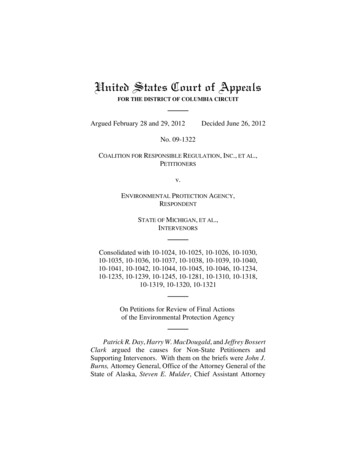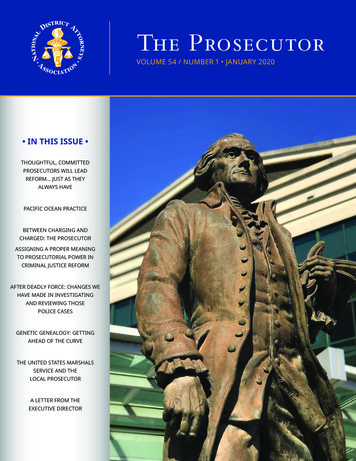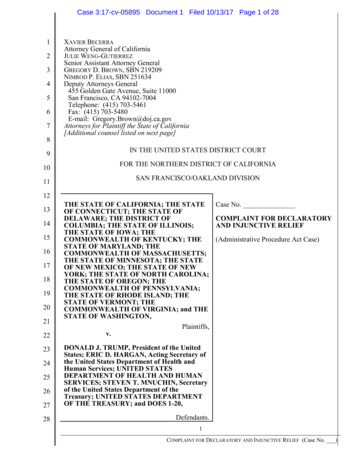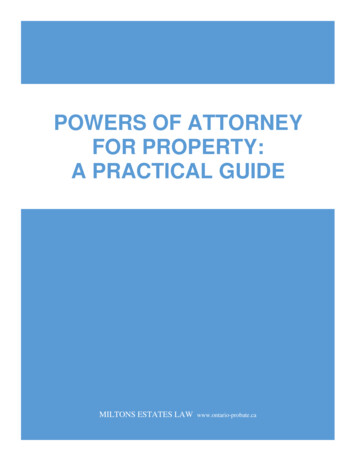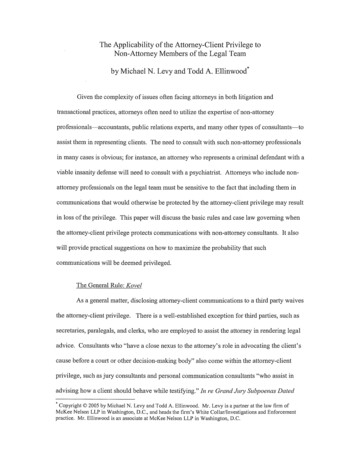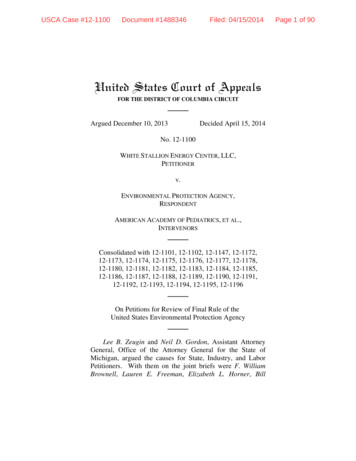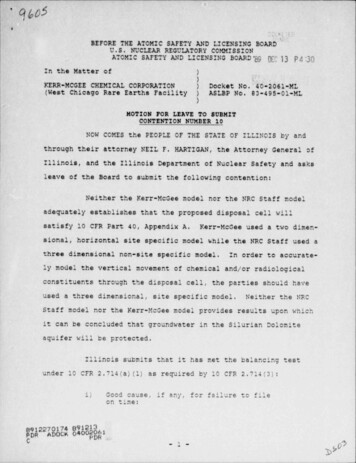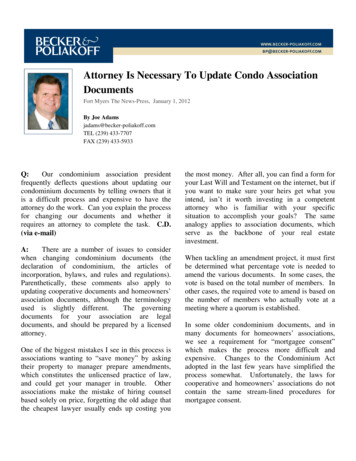
Transcription
Attorney Is Necessary To Update Condo AssociationDocumentsFort Myers The News-Press, January 1, 2012By Joe Adamsjadams@becker-poliakoff.comTEL (239) 433-7707FAX (239) 433-5933Q:Our condominium association presidentfrequently deflects questions about updating ourcondominium documents by telling owners that itis a difficult process and expensive to have theattorney do the work. Can you explain the processfor changing our documents and whether itrequires an attorney to complete the task. C.D.(via e-mail)A:There are a number of issues to considerwhen changing condominium documents (thedeclaration of condominium, the articles ofincorporation, bylaws, and rules and regulations).Parenthetically, these comments also apply toupdating cooperative documents and homeowners’association documents, although the terminologyused is slightly different.The governingdocuments for your association are legaldocuments, and should be prepared by a licensedattorney.One of the biggest mistakes I see in this process isassociations wanting to “save money” by askingtheir property to manager prepare amendments,which constitutes the unlicensed practice of law,and could get your manager in trouble. Otherassociations make the mistake of hiring counselbased solely on price, forgetting the old adage thatthe cheapest lawyer usually ends up costing youthe most money. After all, you can find a form foryour Last Will and Testament on the internet, but ifyou want to make sure your heirs get what youintend, isn’t it worth investing in a competentattorney who is familiar with your specificsituation to accomplish your goals? The sameanalogy applies to association documents, whichserve as the backbone of your real estateinvestment.When tackling an amendment project, it must firstbe determined what percentage vote is needed toamend the various documents. In some cases, thevote is based on the total number of members. Inother cases, the required vote to amend is based onthe number of members who actually vote at ameeting where a quorum is established.In some older condominium documents, and inmany documents for homeowners’ associations,we see a requirement for “mortgagee consent”which makes the process more difficult andexpensive. Changes to the Condominium Actadopted in the last few years have simplified theprocess somewhat. Unfortunately, the laws forcooperative and homeowners’ associations do notcontain the same stream-lined procedures formortgagee consent.
If your amendment threshold is very high (forexample seventy-five percent of all members),many associations seek to first amend theamendment threshold. This happens most often incases where there is a desire to base amendmentapproval on those who vote, rather than all eligiblevoters. Of course, you have a “chicken and egg”,since you must first obtain the higher vote in orderto make the documents easier to amend in thefuture.competent attorney’s recommended format, sincethere is not much room for individual choices. Thesection on assessments and collections is a goodexample of a document clause of this ilk. On theother hand, provisions regarding the allocation ofmaintenance responsibility between the associationand the unit owner, rental restrictions, parkingrules and pet policies vary widely from associationto association. In other words, there is no “onesize fits all” way to address these issues.The next consideration is the subject of the desiredamendments themselves. Sometimes, associationswant to amend their documents to accomplish aresult that is inconsistent with applicable law. I seethis most frequently with associations who want tocharge fees to members that are not authorized bystatute. Therefore, an attorney should review thesubject of the desired amendment, and assumingthe desired objective is lawful, would then draft theappropriate amendment.The projected cost depends on how extensive theamendments are. It can involve anywhere from anhour or so of attorney’s time for a simpleamendment, to several thousand dollars if you arecompletely updating your governing documents. Ifyou speak with an attorney who is familiar withyour association’s documents (and has perhapsidentified problem areas in the documentsthemselves in the past), you can pin-point whetherextensive amendments are in order, or perhaps justa couple of touch-ups here or there. And if yourely on trusted counsel, you may be told that it aintbroke, and don’t fix it.There are some clauses in governing documentswhere an association should simply rely on aJoe Adams has focused his practice on the representation of community associations since 1987, and has providedlegal counsel to well over one thousand community associations throughout the state. Joe has served as Chairman ofthe State Advisory Council on Condominiums and has written this column since 1995.Send questions to Joe Adams by e-mail to jadams@becker-poliakoff.com. This column is not a substitute forconsultation with legal counsel. Past editions of this column may be viewed at www.becker-poliakoff.com.
CAI Chapter Confers Annual AwardsFort Myers The News-Press, January 8, 2012By Joe Adamsjadams@becker-poliakoff.comTEL (239) 433-7707FAX (239) 433-5933The South Gulf Coast Chapter of CommunityAssociations Institute recently held its AwardsNight and honored the following members andassociations.Chapter Association Board Member of the YearAward was presented to Mr. Duane Hunt of OaksIII Condo Association, Port Charlotte, inrecognition of outstanding service to his board andcommunity.The Volunteer of the Year Award was presented toTammy LoVecchio, of Gulfshore Insurance, FortMyers, Naples, and Marco Island.The chapters Partner of the Year Award waspresentedtoCindyD’Artagnan,CindyD’Artagnan, CPA.The On-Site Manager of the Year Award wasawarded to William D. White of ProfessionalCommunity Services of Naples for displaying aconsistently high level of professionalism,diplomacy and work ethic as a qualifiedcommunicator of management concepts. Whenasked his key to success, White gave all the creditto his wife, Cynthia Desmond-White, who is hispartner in the business.The Portfolio Manager of the Year Award waspresented to Ms. Verna Lutz of SandcastleManagement, Naples. When I asked her the secretto success, Lutz said: “This is a service business,and not always a glamorous one. It is not for thosewith big egos. It is really a good fit for people wholike to serve. We want our clients to not only besatisfied with our management, but thrilled.”Sounds like good advice to me.The Rose Ann Podvin Memorial ScholarshipAward for Community Association Managers wasgiven to Sandra Lewis-Foley of Associa GulfCoast.ConferenceThe Law Firm of Becker & Poliakoff, P.A. willhold its 36th Annual Community AssociationLeadership Conference on Tuesday, January 24,2012. The conference is free, and the public iswelcome. The event will take place at the BarbaraB. Mann Center, 8099 College Parkway, FortMyers.Check-in begins at 8:30 a.m. The program starts at9:00 a.m. and runs to 12:30 p.m. This conferencehas been approved by the Florida Department ofBusiness and Professional Regulation for twocontinuing education credit hours (Legal Update)for Community Association Managers. A separatepre-seminar breakfast program, open only to Firmclients, will start at 8:00 a.m., with guest speaker
Ken Wilkinson,Appraiser.theLeeCountyPropertyAttendees at the half-day program will learn aboutstatutory changes made during the 2011Legislative Session in Tallahassee, and how thesechanges affect communities and their dailyoperations. Topics will include board meetingsand elections, official record-keeping, hurricaneprotection, attachment of rents, fines andsuspensions, management fees, and fire safety.Also featured will be a panel of attorneysdiscussing “How to Maintain Smooth Operationsat Your Community”, which will include ruleenforcement issues, followed by a Q&A session.Please register in advance at www.beckerpoliakoff.com/events/ca/ or by e-mailing FranklinScott at fscott@becker-poliakoff.com .Q&AQ:Our condominium association sent out anotice that there are two openings on the board.Three people put in their names, and we justreceived our ballots.However, there is noindication of where you vote for a specific officer,such as the President. Is this correct? D.O. (via email)A:Yes.In nearly all cases, and absent a contrary provisionin the articles of incorporation or bylaws (which Ihave only seen in a few instances), the members ofthe association (called unit owners incondominiums, called unit owners in cooperatives,and called parcel owners in homeowners’associations) elect the “board of directors” oftensimply referred to as “the board.”The board then elects the board’s officers. In mostcases, the officers of the board are the president,the vice-president, the secretary, the treasurer, andassistant officers if so appointed. Officers serve atthe pleasure of the board and may be removed,with or without cause, by the board at any time andreplaced with whomever the board so chooses.Conversely, directors can only be removed fromoffice by vote of the unit/parcel owners.Joe Adams has focused his practice on the representation of community associations since 1987, and has providedlegal counsel to well over one thousand community associations throughout the state. Joe has served as Chairman ofthe State Advisory Council on Condominiums and has written this column since 1995.Send questions to Joe Adams by e-mail to jadams@becker-poliakoff.com. This column is not a substitute forconsultation with legal counsel. Past editions of this column may be viewed at www.becker-poliakoff.com.
Riverwoods Plantation Named Association of YearFort Myers The News-Press, January 15, 2012By Joe Adamsjadams@becker-poliakoff.comTEL (239) 433-7707FAX (239) 433-5933As a follow-up to last week’s column, a few morelocal announcements should be shared.RiverwoodsPlantationRVResortCondominium Association named best of year:The South Gulfcoast Chapter of CAI recentlynamed Riverwoods Plantation RV ResortCondominium, located in Estero, the “Associationof the Year.” This award is presented to recognizethe best local community association, excelling inall facets of their operation. These associationsserve as an example to the industry and encourageeducational and professional growth.I reached out to James Gratton, the Association’sPresident and Rachel Barnell, the Manager. Thefolks at Riverwoods proudly noted that this is theirthird award in the past decade or so, and that theyhave been inducted into CAI’s Hall of Fame.When asked the secret to success, Barnell said:“Although our Community is almost thirty yearsold, our seven-member Board, our managementteam, and our numerous volunteers continuouslystrive to improve our grounds and commonfacilities while maintaining our high standards ofexcellence. We are honored to be recognized.”Seven Lakes Community Honored withHumanitarian Award: Another local association,also always on the short list for awards, is theSeven Lakes Condominium Community located inSouth Fort Myers.This year, Seven Lakesreceived CAI’s “Humanitarian Award” which isnamed after Robert A. White, a well-regardedCommunity Association Manager from the FortMyers area who passed away several years ago.Fittingly, Bob was also the General Manager atSeven Lakes for many years.I contacted the Association and asked forcomments from Board President, John Gamble andGeneral Manager, Jim Schneider. Seven Lakes’representatives told me that the Seven Lakesowners give their time, talents, and money forseveral good causes throughout the year. Forexample, the Association hosts a golf outing wherethe proceeds are donated to homeless veterans.The list of charitable initiatives from thisCommunity are too numerous to print and indeedimpressive.Fundraisers for Haiti earthquakevictims, needy families, blood drives, and purchaseof school supplies for underprivileged children arebut a few.Schneider said: “It’s one of the awards we havereceived that we are most proud of, because itshows the true character of our owners.” In a dayand age when condo associations are usuallydepicted in media as petty or dysfunctional, it istruly heartening to see condo communities set suchan admirable example of community service.
Local Manager Remembered:The localcommunity association management industry lostone of its most respected members with the passingof Richard LaPosta on October 31, 2011.I had known Dick for some 25 years and had thepleasure of representing a number of associationswhich Dick’s firm, Gulf Shores CommunityAssociation Management, also managed.I recently chatted with Dick’s life and businesspartner, his wife, Diane. When I asked what shethought Dick would like best to be rememberedfor, she did not hesitate in stating it was hispersonal pride in every association he managed.Dick was also perhaps somewhat unique inmanagement in that he looked at the homeownersas an integral part of the partnership that isnecessary to successfully run a community, not anenemy force to be avoided.Diane tells me that Dick had a special fondness forthe Foxmoor Community located in North FortMyers, which he had managed for some 20 years.In fact, even when Dick knew that his time wasshort, he insisted on being driven around thecommunity every day to make sure his standards,and the expectations of his client, were being met.Dick leaves four children, nine grandchildren, andfour great grandchildren, along with Diane. Dickwas a good guy and left us too early at age 72.Joe Adams has focused his practice on the representation of community associations since 1987, and has providedlegal counsel to well over one thousand community associations throughout the state. Joe has served as Chairman ofthe State Advisory Council on Condominiums and has written this column since 1995.Send questions to Joe Adams by e-mail to jadams@becker-poliakoff.com. This column is not a substitute forconsultation with legal counsel. Past editions of this column may be viewed at www.becker-poliakoff.com.
Your Association is Likely Able to Stop Owner’sRenegade RentalsFort Myers The News-Press, January 22, 2012By Joe Adamsjadams@becker-poliakoff.comTEL (239) 433-7707FAX (239) 433-5933Q:Our condominium documents state that anowner can rent his condominium for a minimum of90 consecutive days. This restriction was voted onand passed in 2003. However, there is an ownerwho rents his unit each year, but the renters onlystay for 60 days. It is obvious that the owner isskirting the rules. How can this document beenforced? C.F. (via e-mail)A:Your condominium documents are fairlytypical in restricting the minimum term of leases.In addition, many condominium associations alsorestrict the number of leases per year. Obviously,those associations want to avoid a “hotel-like”atmosphere that might not mesh well with thelifestyle of permanent residents. Your associationshould only approve leases that meet theserequirements.The subject of lease term and frequency of leaseshas been prominent in Florida condominium lawover the past decade. In 2002, the Florida SupremeCourt ruled that lease restrictions could be added tocondominium documents by amendment evenwhen owners purchased their units with theexpectation of unrestricted leasing. In response,the Florida legislature implemented Section718.110(13), F.S. in 2004, which provided that anynew leasing restrictions are only effective againstthose unit owners who voted in favor of the leasingrestrictions and those unit owners who took titleafter the leasing restrictions were adopted. Thatstatute was recently clarified to confirm that thegrandfathering rule only applies to leasingrestrictions concerning the term and frequency ofleases. Given that your current restrictions wereadopted in 2003, before the statute was amended in2004, your leasing restrictions apply to all ownersin the community. Clearly, any owner in yourassociation who submits a proposed lease mustsubmit a lease for at least a 90 day term. However,there is no requirement that the tenants mustactually stay in residence for the entire 90 days.Any tenant is free to leave, or not occupy the unitat all. However, it is also clear that, pursuant toyour restrictions, the owner is not able to lease theunit again until the expiration of the 90 days, and Iwould argue, not entitled to use the unit himself orhave any person other than the approved renteroccupy the unit. You might want to check yourrules or documents on that point, and update themif necessary.Q:I have a signed purchase agreement on ashort sale that was signed in April of 2011. Theprice had already been approved by the bank so Ithought it wouldn't be such a problem and thingswould go smoothly. To my frustration, the bankhad not yet approved the sale and I have been
informed that the property is most likely going togo into foreclosure.Why would a lender not approve another sale at thesame price? Why would they drag it out so longsince the price was already approved? Can theychange the deal and force it into foreclosure?What, if any, legal stance do I have with the signedagreement? What will happen, or should happen ifit does go into foreclosure, do I have firstopportunity to purchase the property? C.B. (via email)A:Many people experience frustration dealingwith lenders.Your question seems to say that the lender whoholds the mortgage approved your short sale priceon a contract that you signed this Spring. Now,about nine months later, you “have another sale”,presumably under a new contract to buy the house,at the same price, but the lender no longer seemscooperative.If the lender approved the first contract in writing,and then held up that sale at the last moment, youmight have had a cause of action. In order to havea “legal stance”, with some rights against thelender, you would have to show a legalcommitment by the lender. That commitmentwould either have to be by written approval, orperhaps by some less formal action when youdetrimentally change your position in reasonablereliance on that less formal action.There may be terms of the new contract that thelender won’t approve, or the lender may haverevised internal policies regarding accepting shortsales. Many lenders have revisited their policiesover the past several years. Some have grownmore conservative while others have started toshow more latitude.Everyone has an equal opportunity to buy theproperty at the foreclosure sale. If you want to tiethe property up, you, your attorney, or your realestate agent, must find out whether the lender willwork with you, or whether the short sale is nolonger available.Joe Adams has focused his practice on the representation of community associations since 1987, and has providedlegal counsel to well over one thousand community associations throughout the state. Joe has served as Chairman ofthe State Advisory Council on Condominiums and has written this column since 1995.Send questions to Joe Adams by e-mail to jadams@becker-poliakoff.com. This column is not a substitute forconsultation with legal counsel. Past editions of this column may be viewed at www.becker-poliakoff.com.
Condominiums Aren’t Required to Hire ManagerFort Myers The News-Press, January 29, 2012By Joe Adamsjadams@becker-poliakoff.comTEL (239) 433-7707FAX (239) 433-5933Q:I am the president of a condominiumassociation. We have 40 units and a budgetexceeding 140,000.00. The president of anothercondominium association informed me that everycondominium association with 10 or more units ora budget over 100,000 must have a licensedproperty manager. Is this true? T.N. (via e-mail)A:No. I believe the person you were speakingwith may have been confusing the issue of whethera condominium association must employ acommunity association manager with the issue ofwhether a community association manager must belicensed if the association chooses to employ amanager.There is no provision of law that requires acondominium association (or a cooperative orhomeowners’ association for that matter) to hire acommunity association manager. A condominiumassociation may manage itself, if it so chooses.However, if the association chooses to retain acommunity association manager (either anemployee or independent contractor/managementcompany), the law provides that the manager ormanagement firm must be licensed. There is a socalled “de minimis exception” when theassociation or associations to be served by amanager collectively contain less than 10 units orhave a budget of less than 100,000.“Community association management” is definedrather broadly in the Florida Statutes to mean anyof the following practices requiring substantialspecialized knowledge, judgment, and managerialskill: controlling or disbursing funds of acommunity association, preparing budgets or otherfinancial documents for a community association,assisting in the noticing or conduct of nance for the residential development andother day-to-day services involved with theoperation of a community association.Q:In your remarks about “pets” in a recentcolumn, I believe a comment should have beenmade regarding the American Disabilities/ServiceDogs based on the revision effective March 15th of2011. C.S. (via e-mail)A:It is important to recognize that there aretwo different federal laws that impact anassociation’s ability to enforce pet restrictions dueto a disability of the unit owner. You have askedspecifically about the Americans with DisabilitiesAct of 1990 (ADA), which prohibits discriminationagainst individuals with disabilities in any “placeof public accommodation.” The law defines a“public accommodation” to include an inn, hotel,motel, or “other place of lodging.” There iscaselaw from federal courts concluding that aresidential apartment or condominium is not a
“public accommodation” and that therefore theADA does not apply to such facilities. However,recent regulations adopted by the Department ofJustice (DOJ) have clarified that the ADA wouldapply to an apartment or condominium if thefacility has the characteristics of a hotel, i.e., staysof 30 days or less, accepts reservations from walkups or call-ins, provides linen service, etc.Whether the ADA applies to your condominiumwill depend on the specific facts. As indicated inyour e-mail, the service animal regulations wererecently revised, such that for purposes of theADA, a “service animal” only includes a dog (anda miniature horse under certain conditions) that hasbeen individually trained to do work or performtasks for a person with a disability. Emotionalsupport animals are not service animals under theADA.The law that would more likely be applicable to asituation involving a unit owner in a residentialcondominium is the Fair Housing AmendmentsAct of 1988 (FHA), which prohibits discriminationagainst disabled persons in housing. It is aviolation of the FHA for a "housing provider",which includes condominium and homeowner'sassociations, to refuse to make "reasonableaccommodations" in its rules, policies, practices orservices, when such accommodation may benecessary to afford a handicapped person an equalopportunity to use and enjoy a dwelling or thecommon areas associated with the dwelling.Therefore, a handicapped person may be entitled tokeep an assistance animal as a reasonableaccommodation if the person has a handicap andthere is a nexus between the handicap and theassistance that the animal provides.One factor distinguishing the FHA from the ADAis that under the FHA and its regulations, whichare adopted by the Department of Housing andUrban Development (HUD), there is no specificdefinition of “service animal.” Accordingly, theFHA is not limited to dogs. Also, the FHA hasbeen applied to emotional support animals, andwhether or not training is required under the FHAdepends on the facts.Both DOJ and HUD have confirmed theirrespective positions that it is not necessary for anassistance animal under the FHA to qualify as aservice animal under the ADA, and vice versa.Because violations of the ADA or FHA can resultin substantial liability for an association, themanager, and even individual board members, it isimportant to consult with qualified counsel whendealing with one of these situations.Joe Adams has focused his practice on the representation of community associations since 1987, and has providedlegal counsel to well over one thousand community associations throughout the state. Joe has served as Chairman ofthe State Advisory Council on Condominiums and has written this column since 1995.Send questions to Joe Adams by e-mail to jadams@becker-poliakoff.com. This column is not a substitute forconsultation with legal counsel. Past editions of this column may be viewed at www.becker-poliakoff.com.
Mandatory HOA Needs Unanimous SupportFort Myers The News-Press, February 5, 2012By Joe Adamsjadams@becker-poliakoff.comTEL (239) 433-7707FAX (239) 433-5933Q:I live in a subdivision where membership inthe homeowners’ association is voluntary. Ourdeed of restrictions have expired, and theassociation is now trying to get our owners toapprove the creation of a mandatory homeowners’association. Can the owners create a mandatoryassociation and require all owners to be membersand pay assessments to maintain the commonareas? D.M. (via e-mail)A:Yes, but it won’t be easy. Based on casespreviously decided by the appellate courts of thisstate, you cannot require property owners to bemembers of a mandatory homeowners’ associationunless all owners approve. Approval of mortgagelenders and other lienholders may also be required.You state that your deed of restrictions have“expired.” If the document has expired on its ownterms, then it is basically “dead” and the attorneyyou retain to work on this project should simplydraft a modern set of restrictions, that will beagreeable to one hundred percent of your lotowners, including a provision for membership inthe association.If you determine that unanimous consent is notfeasible, you should also have your attorneydetermine whether the documents may not havereally “expired”, but rather been “extinguished” byFlorida’s Marketable Record Title Act. Revivingexpired covenants is permitted for non- mandatoryhomeowner’s associations, if the association hasthe right to enforce the deed restrictions.Your questions really need to be answered by acompetent attorney after reviewing all of the factsand the governing documents for your community.However, it is probable that you will not be able tocreate a mandatory homeowners’ associationunless you obtain unanimous approval.Q:Can an individual be the president of acondominium association board for fiveconsecutive years? Don’t they have to changepositions after a two-year term? P.A. (via e-mail)A:Your question raises several issues, onebeing permissible terms of board members, thesecond being term limits, and thirdly, thedifference between directors and officers on theapplication of these rules. As has been discussedin this column previously, the FloridaCondominium Act was amended in 2008 toprovide that terms of board members expire at theannual meeting unless two-year staggered termsare voted in. Therefore, if your association’sbylaws contain a two-year staggered termprovision, then board members for your associationserve for two-year terms.
While the director’s term may be for only twoyears, there is no limitation in the CondominiumAct which prohibits a sitting board member fromrunning for subsequent terms. In other words, thestatute does not, in and of itself, impose “termlimits”, meaning that directors can seek re-electionas many times as they want. There has alwaysbeen some debate as to whether the bylaws of anassociation can impose term limits. Withoutbelaboring the somewhat conflicting historicalinterpretations on this issue, I believe the questionwas laid to rest by the 2011 amendment to thestatutes, and that term limits are now clearly valid,if contained in the bylaws. Please note, however,that term limits apply to how many years a personcan serve on the board of directors.Your question deals with director service as aparticular office, here president. There is noprovision in the statute, nor in any set of bylawsthat I have ever seen, which prohibits boards fromelecting whoever it so chooses to serve as theboard’s officers, including president. That said,Florida’s Not-For-Profit Corporation Act, Chapter617 of the Florida Statutes, does permit the bylawsto establish the qualifications of officers. I do notthink it would be illegal to state one could notserve in a particular office (e.g., office of thePresident) for more than so many years, but itcertainly would not be a common provision.The issues concerning term limits and staggeredterms is a condominium specific issue. Neither theCooperative Act, Chapter 719, nor theHomeowners’ Association Act, Chapter 720, haveanalogous provisions which limit the use ofstaggered or multi-year terms. Further, there is nosimilar provision in either the Cooperative orHomeowners’ Association Act that can be reliedon to articulate a justification for supporting termlimits.Joe Adams has focused his practice on the representation of community associations since 1987, and has providedlegal counsel to well over one thousand community associations throughout the state. Joe has served as Chairman ofthe State Advisory Council on Condominiums and has written this column since 1995.Send questions to Joe Adams by e-mail to jadams@becker-poliakoff.com. This column is not a substitute forconsultation with legal counsel. Past editions of this column may be viewed at www.becker-poliakoff.com.
Delinquent Accounts Can Be Liable For InterestFort Myers The News-Press, February 12, 2012By Joe Adamsjadams@becker-poliakoff.comTEL (239) 433-7707FAX (239) 433-5933Q:What can be done about a delinquent ownerwho is ignoring late fees and interest that were puton their account? E.M. (via e-mail)A:W
By Joe Adams jadams@becker-poliakoff.com TEL (239) 433-7707 FAX (239) 433-5933 Q: Our condominium association president frequently deflects questions about updating our condominium documents by telling owners that it is a difficult process and expensive to have the attorney do the work. Can you explain the process
